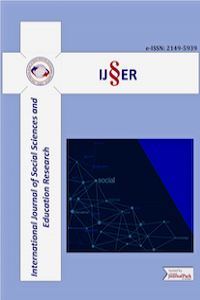Effects of social networking sites usage on psychological well-being of undergraduates in Nigerian universities
Social Networking Sites, , Psychological wellbeing, Undergraduates,
___
- Agosto, D. E., & Abbas, J. (2010). High School Seniors’ Social Network and other Ict Use Preferences and Concerns. Proceedings of the American Society for Information Science and Technology, 47, 1, 1-10
- Amelia, C.S. (2014). Exploring the effects of Social Media use on the Mental Health of Young Adults. An online thesis submitted to the College of Sciences and Burnelt Honours College, University of Central Florida Orlando, Florida.
- Ashiekpe, J. A & Mojaye, E. M. (2017). Influence of social media use on the social development of Nigeria adolescents and youths. Journal of Social and Management Sciences 12, 1, 91-100
- Boyd, D. (2015). Why Youth Heart Social Networking Sites: The Role of Networked publics in Teenage Social Life, 119-12
- Bufferdi, L. E., & Campbell, W. K. (2008). Naraissm and social networking web sites. Personality and social psychology bulletin, 34, 10, 1303-1314
- Burke, M, & Kraut, R. E. (2016). The relationship between Facebook Use and Well-being Depends on Communication Type and Tie Strenght, J Comput-Mediat Comm, 21: 265-281. Doi: 10.111/jcc4.12162im
- Eida, T. (2015). Benefit and Risks of Children and Adolescents using Social Media. European Scientific Journal 11, 13, 321-332
- Gerrig, R. & Zimbardo, P. (2002). Psychology and Life. Boston: Pearson Education
- Godfrey, M.; & Nisbert, T. T. (2014). Social Media and the Moral Development of adolescents are pupils’ soul mates antagonists? Zimbabwe journal of education 26, 1, 100-120
- Helen, N.E.; Charles, O. O.; & Janifer. N.O. (2014). The use of social networking sites among the undergraduate students of university of Nigeria Nsukka. Library philosophy and practice (e-journal) libraries at university of Nabraska-Lincoln.
- Ito, M., Baumer. S., Bittenti, M., & Boyd, D. (2008). Living and learning with new media: Summary of findings from the digital youth project. Chicago, Il: John D, and Catherine T. MacArthur foundation reports on digital media and learning. Available at httpll digital youth ischool berkeleg. Edu|files|report|digital youth two page summary
- Kallay, E. & Rus, C. (2014). Psychometric properties of the 44-item version of Ryffs Psychological Well-Being Scale. European Journal of Psychological Assessment. 30 (1), 15
- Kim, J. & Lee, J. E. (2011). The Facebook paths to happiness: effects of the number of Facebook friends and self-presentation on subjective well-being. Cyber Psychology, Behaviour & Social Networking, 14 (6), 359-364. Doi: 10.1089/cyber.2010.0374
- Kross, E., Verduyn, P., Demiralp, E., Park, J., Lee, D. S., Lin, N., Shablack, H., Jonides, J. Ybarra, O. (2013). Facebook Use predicts Declines in Subjective Well-Being in Young Adults. PLoS ONE, 8 (8), 1-6
- Livingstone, J. (2008). The Role of Social Networking Sites in Early Adolescents Social Lives. The Journal of Early Adolescence 36 (8), 348-371
- Maulik, P., Eaton, W., & Bradshaw, C. (2011). The effect of Social Networks and Social Support on mental health services use, following a life event among the Baltimere Epidemic-logic catchment area. The Journal of Behavioural Health Services and Research, 38 (1), 29-50
- Mesika, C. (2012). Traditional African education: its significance to current educational practices with special reference to Zimbabwe, Gweru: Mambo Press
- Nabi, R., L., Prestin. A., & So, J. (2013). Facebook Friends with (Health) Benefits? Exploring Social Network Site Use and Perceotions of Social Support, Street and well-being. Cyber Psychology Behaviour and Social Networking 16 (10), 721-727
- Olasinde, E. A. (2014). An analysis of the influence of social media sites on Nigerian undergraduates. International policy brief series-education and science journal 4, 1, 53-65 Onomo, A. A. (2012). People power. 15 social media. The guardian, pp 38
- Rukimi, .M. (2007). Being African: Rediscovering the traditional unhubuntu-botho pathways of being human. Arcadia: Mandala publishers.
- Seo, D. G., Park, Y., Kim, M. K., & Park, J. (2016). Mobile Phone dependency and its impacts on Adolescents Social and Academic Behaviours. Computer in Human Behaviour 63, 282-292
- Speneer, P. C. (2018). Social Media use and its impact on relationships and emotions. A published master’s thesis submitted to the faculty of Brigham Young University, School of Communication.
- Umberson, D. & Montez, J. (2010). Social relationships and health: A flash point for health policy. Journal of health and social behavior. 51 (Suppl), 554-556
- Valkenburg, P. M. Peter, J., & Schouten, A. P. (2006). Friend Networking Sites and Their Relationship to Adolescents Well-being and Social Self-Esteem. Cyber Psychology & Behaviour, 9 (5), 584-590
- Wang, J. J., Jackson, L. A., Gaskin, J., & Wang H. Z. (2014). The effects of Social Networking Sites (SNS) use on college students’ friendship and well-being. Computer in Human Behaviour, 37, 229-236
- Yayın Aralığı: Yılda 4 Sayı
- Başlangıç: 2015
- Yayıncı: Mahmut DEMİR
Mamane Bachirou DJIBRIL ISSOUFOU, Esen ALTUNAY
Türkiye’ de genç işsizlik sorunu ve belirleyicileri üzerine logit model analizi
Bedriye TUNÇSİPER, Ezgi Zeynep RENÇBER
Türkiye’de Covid-19 sürecinde turizmle ilgili yayınlanan genelgelerin analizi
Vahide YİĞİT GENÇTEN, Emel GENC
Gülüzar KURT GÜMÜŞ, Nehir BALCI
